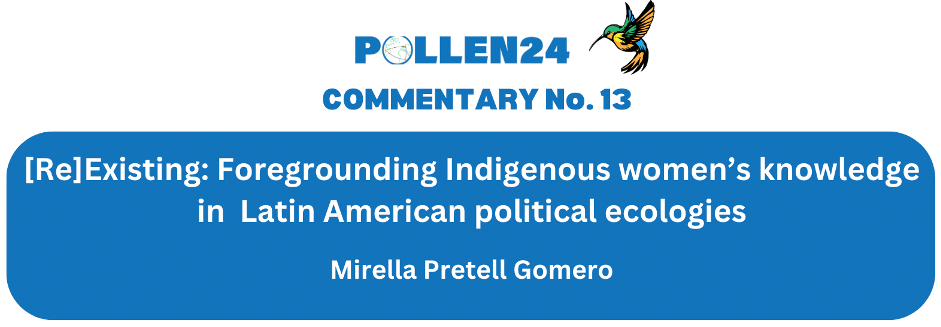2024-05-16
[Re]Existing: Foregrounding Indigenous women’s knowledge in Latin American political ecologies.

Abstract
[Re]Existing: Foregrounding Indigenous women’s knowledge in Latin American political ecologies
The ‘political ecology of the South’ is rooted in the colonial legacy’s intricacies, simultaneously embedded in struggles for resistance and emancipation (Leff, 2015b). Though sharing commonalities with the political ecology of the North (Bryant & Bailey, 1997; Peet & Watts, 1996; Blaikie & Brookfield, 1987; Hecht & Cockburn, 1989/2010; Peluso, 1994), primarily theoretical and methodological and embrace a joint political commitment (Wolford & Keen, 2015), the political ecologies that have emerged and keep emerging in/from Latin America are traced in particular genealogies and carry a deep-rooted commitment with struggles for emancipation and long-standing anti-colonial resistance movements (Leff, 2015a, 2015b, Alimonda, 2017; Escobar, 2017). This ‘political ecology of the South’ builds upon postcolonial theories and the politics of difference, intertwined with a broader political project of emancipation and decolonization.
Latin American political ecologies trace their roots in the groundbreaking work of José Carlos Mariátegui, who approached the land question as an indigenous question imbricated in the colonial legacy. Further, the intellectual work of Leonardo Boff, Paulo Freire, and Eduardo Galeano examined the relationship between resource extraction, colonialism, and poverty. Decolonial scholars such as Quijano (2000), Mignolo (2000), Moraña & Dussel (2014), and Lander (2000), among others, also drew from these genealogies. Additionally, the contribution of liberation theology is crucial. What connects these lines of thought is their embeddedness in the everyday struggles of the colonized, Indigenous, peasant, and Afro-descendant peoples.
In this short paper, I highlight that the struggles that prompted political ecology to emerge intellectually and politically within the Latin American context remain with nuances that require particular attention. Among those lies the necessity to place gendered and racialized processes at the center and their relationship with environmental change to demarginalize them while acknowledging that multiple ‘ways of knowing’ exist as means of resistance that help understand political ecology more broadly. In doing so, I stress the necessity of foregrounding Indigenous women’s epistemologies to decolonize knowledge production by centering on Indigenous women’s everyday lives while regarding gendered knowledge as key to addressing environmental concerns.
For Ulloa (2015), political ecology has influenced Latin American social sciences in analytical terms, while Latin American conceptualizations have contributed to rethinking political ecology. As she suggests, the Latin American contribution lies mainly in understanding that environmental processes are scalar, spatial, and multi-actor. This diversity of actors provides a broader outlook on how to ‘exist’ in the territory, considering people’s traditional relationship with nature and their development alternatives (Ulloa, 2015). Ulloa’s view is particularly relevant in understanding the specificity of each context, given the multiple Latin American realities and their relationship with capitalist accumulation.
Conversely, for Alimonda (2017), Latin American political ecology has evolved to become a political-intellectual field with a distinctive structure and dynamics of ‘enunciation,’ not similar to any other political-intellectual tradition. More specifically, drawing on Martinez-Alier (2014 in Alimonda, 2017), Latin American political ecology is not an academic/university field of human geography or social anthropology. Instead, it belongs to its own critical thinking that is relevant worldwide, whose authors are deeply involved in environmental activism in their countries or the continent. Political ecology, thus, comprises a “broad social and political movement for environmental justice which is stronger in Latin America than in other continents” (Martinez Alier, 2014 in Alimonda, 2017, p.40). Although it is possible to identify academic influences in Latin American political ecology, what defines it essentially is the encounter between Latin American critical thinking and the diversity of experiences and strategies of resistance carried out by the pueblos facing a resource extraction economy (Martin & Larsimont, 2014 in Alimonda, 2017).
Thus, I question how we can envision ‘nuanced futures’ from a Latin American perspective—if any—considering that there is no such universal ‘Latin American.’ More so, the term ‘Latin American’ could be perceived as excluding Indigenous knowledge[s] within academic instances. Rocheleau (2015) refers to the “chasm between local and ‘scientific’ knowledges, men’s and women’s knowledges” (p. 80) that, in her years of experience in the field, made her reflect on the necessity to address the scaling of the complex social relations of power and how these shape the material realities to investigate. Further, she maintained that political ecology must acknowledge “the role of indigenous and activist thinkers as experts” (Rocheleau, 2015, p. 87) and knowledge producers instead of looking at them solely as objects of study. I am convinced that creating a bridge between different ways of knowledge production and adopting methodologies that eradicate the “othering” while enhancing collectivity is fundamental for political ecology’s nuanced and diverse decolonial future.
In that vein, I propose that it is paramount to foreground indigenous women’s knowledges in the political ecology work carried out in and for Latin America. That is, despite the significant contribution of feminist political ecologists (Sundberg, 2004; Asher, 2014; Rocheleau & Nirmal, 2015; Elmhirst & Resureccion, 2008; Harcourt & Nelson, 2015), and the efforts to integrate Indigenous views into political ecology (Middleton, 2015; TallBear, 2014), it remains a less explored endeavor to incorporate an expanded decolonial approach centered on Indigenous women’s knowledges, foregrounding their diverse worlds, worldviews, cosmologies, technologies, and ancestral practices. Also, recognizing that it is a pending task that theory and praxis converge in an exercise of decolonization of knowledge, resulting in the fostering of multiple ways of knowing that come from Indigenous women, specifically from their material everyday lives. Drawing from the notion of ‘decoloniality of knowing and being’ coined by Quijano (2000) and Segato’s (2014) decolonial analysis of Indigenous women in Brazil, I suggest that the future of political ecology must consider how Indigenous identity is constructed through the collective material everyday lives of Indigenous women speaking from their own lived experiences and lived contexts. I further developed this approach in partnership with the Kukama Indigenous women’s organization Huaynakana Kamatahuara Kana in the Peruvian Amazon. Through my work, I emphasize that it is a decolonial feminist endeavor to reclaim the erased epistemologies of Indigenous women. I argue that it is crucial to center academic/activist work on finding ways to place Indigenous women at the forefront, not in an extractive way – hence, being attentive to issues of representation – but to create the spaces (in the fieldwork and outside of it) where their epistemologies are acknowledged and valued.
Notes
[1] Syracuse University
References
Alimonda, H. 2017. En clave de sur: la Ecología Política Latinoamericana y el pensamiento crítico. In Alimonda, H., Toro Pérez, C., & Martín, F. (Eds.) Ecología política latinoamericana: Pensamiento crítico, diferencia latinoamericana y rearticulación epistémica Vol. 1. Buenos Aires: CLACSO
Asher, K. 2014. The doers and the done for: interrogating the subjects and objects of engaged political ecology. ACME: An International Journal for Critical Geographies, 13(4), 489–496.
Blaikie, P., and H. Brookfield. 1987. Land degradation and society. London: Routledge
Bryant, R., and S. Bailey. 1997. Third World political ecology. New York: Routledge
Elmhirst, R. and Resurreccion, B. (Eds.). 2008. Gender and Natural Resource Management: Livelihoods, Mobility and Interventions. London: Earthscan.
Escobar, A. 2017. Desde abajo, por la izquierda, y con la tierra: la diferencia de Abya Yala/Afro/Latino/América. In Alimonda, H., Toro Pérez, C., & Martín, F. (Eds.) Ecología política latinoamericana: Pensamiento crítico, diferencia latinoamericana y rearticulación epistémica Vol. 1. Buenos Aires: CLACSO.
Harcourt, W., and Nelson, I. L. (Eds.). 2015. Practicing feminist political ecologies: Moving beyond the 'green economy.' London: Zed Books.
Hecht, S. B., and Cockburn, A. 1989. The fate of the forest: Developers, destroyers, and defenders of the Amazon. University of Chicago Press.
Lander, E. (Ed.). 2000. La colonialidad del saber: eurocentrismo y ciencias sociales. Perspectivas latinoamericanas. Buenos Aires: CLACSO/UNESCO.
Leff, E. 2015a. Encountering political ecology: epistemology and emancipation. In Bryant, R. (Ed.). The International Handbook of Political Ecology. London: Edward Elgar Publishing.
Leff, E. 2015b. The power-full distribution of knowledge in political ecology: a view from the South. In Perreault, T., Bridge, G., & McCarthy, J. (Eds.) The Routledge Handbook of Political Ecology. London: Routledge.
Middleton, B. R. 2015. Jahát Jatítotòdom*: toward an indigenous political ecology. In Bryant, R. (Ed.) The International Handbook of Political Ecology. Cheltenham: Edward Elgar.
Mignolo, W. 2000. Local histories/global designs: coloniality, subaltern knowledges, and border thinking. Princeton: Princeton University Press.
Moraña, M., Dussel, E., & Jáuregui, C. A. 2014. Coloniality at large: Latin America and the Postcolonial Debate. Duke University Press Books.
Peet, R., and M. Watts. 1996. Liberation ecologies: Environment, development, social movements. New York: Routledge.
Peluso, N. 1994. Rich Forests, Poor People: Resource Control and Resistance in Java. Berkeley: University of California Press.
Quijano, A. (2000). La colonialidad del saber: eurocentrismo y ciencias sociales. Perspectivas latinoamericanas, Buenos Aires: FLACSO, 2000: 201-246
Rocheleau, D., 2015. Roots, rhizomes, networks, and territories: reimagining pattern and power in political ecologies. In Bryant, R. (Ed.) The International Handbook of Political Ecology, Cheltenham: Edward Elgar.
Rocheleau, D., & Nirmal, P. 2015. Feminist Political Ecologies: Grounded, Networked and Rooted on Earth. In R. Baksh & W. Harcourt (Eds.), The Oxford Handbook of Transnational Feminist Movements (pp. 793–814). Oxford: Oxford University Press.
Segato, R. L. 2014. El sexo y la norma: frente estatal, patriarcado, desposesión, colonidad. Revista Estudos Feministas, 22, 593-616.
Sundberg, J. 2004. Identities in the making: conservation, gender and race in the Maya Biosphere Reserve, Guatemala. Gender, Place & Culture, 11(1), 43-66.
TallBear, K. 2014. Standing with and speaking as faith: A feminist-indigenous approach to inquiry. Journal of Research Practice, 10(2), Article N17.
Ulloa, A., 2015. Environment and development: reflections from Latin America. In Perreault, T., Bridge, G., & McCarthy, J. (Eds.) The Routledge Handbook of Political Ecology. London: Routledge.
Wolford, W. and Keen, S. 2015. Social movements. In Perreault, T., Bridge, G., & McCarthy, J. (Eds.) The Routledge Handbook of Political Ecology, London: Routledge.
